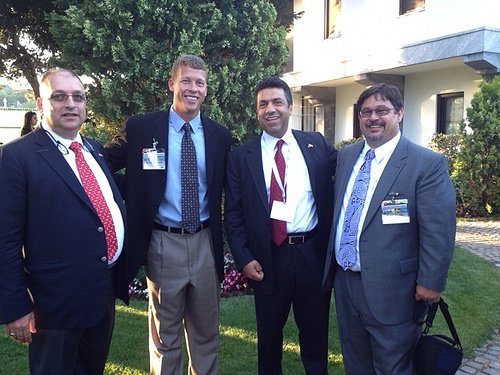
Scott Hudson (second from left) stands in front of the U.S. Embassy in Turkey with two Turkish businessmen, a nut buyer (left) and marketing group CEO. The fourth man is a soybean farmer from the Midwest (far right).
By Kent Politsch, Chief, FSA Public Affairs
Do they like pecan pie in Turkey? If they don’t now, they will soon if Randy Hudson has anything to say about it.
Hudson, his wife Mary Jo and their family operate Hudson Pecan Company in Ocilla, Ga. Currently, they have their hopes focused on Turkey as a potential new market. This past June, Scott Hudson, Randy’s son and company vice president, traveled with USDA’s Undersecretary for Farm and Foreign Agriculture Services, Michael Scuse, on a trade mission to Turkey. Their goal was to introduce the pecan to prospective buyers.
The June trade mission was part of President Obama’s National Export Initiative to double exports by 2014. Agriculture exports have remained on record-breaking pace since 2009. The 2012 ag exports reached $135.8 billion, nearly tripling the values from 1999 ($48 billion).
Scott Hudson returned to Turkey in October with fellow Georgia grower Will Easterlin. They met with representatives of two of the largest nut processors.
“We spent five more days; made some contacts,” Hudson said. “They’re extremely interested.”
Hudson shipped 2,000 pounds of pecans to Turkey in November, a relatively small amount, but he’s hopeful it will lead to further sales. “We know there’s a market there.”
Randy Hudson’s great grandfather dug up a few naturally growing pecan trees and organized them into rows so he could manage his harvest in the late 1800s. Native Americans introduced the nut to settlers – pecan was named by the Algonquin Tribe and means “nut that needs a stone to crack.”
Randy Hudson inherited a 20-acre pecan orchard and turned it into a business in 1981. He said those 20 acres gave his two sisters and him an opportunity to attend college, so he has an emotional tie to the land and business.
His father was a county extension agent. Randy followed in his father’s footsteps and parlayed an undergraduate soil science degree into a Ph.D. Then he parlayed the 20 acres into 1,500 and became president of the Georgia Pecan Growers Association.
He had education and tradition, but what he didn’t have was an expandable market for pecans. Dr. Hudson said they weren’t making that much money until he took a chance and began to export his crop. Everything changed in the 1990s when the family introduced the pecan to new consumers in China. Hudson Pecan Company was soon generating revenue of $20 million annually selling their own pecans and marketing for others.
Turkey is now where China was in the ‘90s, according to Hudson’s Chief Operations Officer Phil Croft. Randy Hudson concurred, saying growers from South Carolina to California produce 300 million pounds of pecans each year but they began enjoying profitable margins only after the Chinese and other international buyers started eating pecans. International markets “made our company what it is today,” Dr. Hudson added gleefully.
He credits USDA with opening the door. With tight margins for domestic sales, there wasn’t much money for research and expansion until USDA’s Foreign Agricultural Service introduced the Market Access Program that included funds from the Commodity Credit Corporation to help U.S. producers, exporters, private companies and other trade organizations finance promotional activities for agricultural products.
Dr. Hudson also credits the Farm Service Agency and Natural Resources Conservation Service with providing conservation plans and practices that prevent erosion around their orchards, making them good stewards and keeping their trees healthy. Programs also enable them to manage pests that threaten their trees and crops.
With support and encouragement from USDA, Hudson and other pecan growers are now concentrating on the Turkish diet. They’re shaking one hand at a time and introducing the pecan with every handshake, glad for the opportunity extended by USDA.





